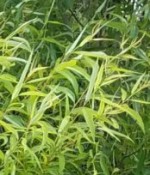 Black willow is a deciduous single to multiple-stemmed tree native to North America from New Brunswick to Minnesota, south to Florida and Texas where it grows in low woods, floodplains, pond margins, and ditches. It is a member of the willow family, Salicaeae. that also includes poplar, aspen, and cottonwoods. Young twigs are green and flexible while the dark brown to black bark on the branches and trunk develops fissure and may become shaggy with age. The linear pointed leaves are two to six inches long and have finely serrated margins. They are dark green with silvery undersides turning an uninteresting greenish-yellow in fall. Inconspicuous yellowish green male and female flowers are produced in separate catkins one to three inches long on different trees in spring as the new leaves emerge. The fruit is small capsule less than ¼ inch long filled with numerous minute seeds. Black willow is fast growing but short-lived, tolerates waterlogged soil and periodic flooding but has roots that often clog sewer and drains, suffers from a number of diseases, and has weak wood so is prone to breaking that can cause litter problems. Useful for an area with wet soil or one that has erosion issues. The generic name Salix is the Latin name for the tree. The specific epithet nigra comes from the Latin word niger meaning black.
Black willow is a deciduous single to multiple-stemmed tree native to North America from New Brunswick to Minnesota, south to Florida and Texas where it grows in low woods, floodplains, pond margins, and ditches. It is a member of the willow family, Salicaeae. that also includes poplar, aspen, and cottonwoods. Young twigs are green and flexible while the dark brown to black bark on the branches and trunk develops fissure and may become shaggy with age. The linear pointed leaves are two to six inches long and have finely serrated margins. They are dark green with silvery undersides turning an uninteresting greenish-yellow in fall. Inconspicuous yellowish green male and female flowers are produced in separate catkins one to three inches long on different trees in spring as the new leaves emerge. The fruit is small capsule less than ¼ inch long filled with numerous minute seeds. Black willow is fast growing but short-lived, tolerates waterlogged soil and periodic flooding but has roots that often clog sewer and drains, suffers from a number of diseases, and has weak wood so is prone to breaking that can cause litter problems. Useful for an area with wet soil or one that has erosion issues. The generic name Salix is the Latin name for the tree. The specific epithet nigra comes from the Latin word niger meaning black.
Type: Deciduous tree
Outstanding Feature: Foliage; tolerance of wet soil; erosion control potential
Form: Spreading, irregular crown
Growth Rate: Rapid
Bloom:Inconspicuous yellowish green male and female flowers in separate catkins one to three inches long on different trees in spring at time of leaf emergence
Size: 30-60’ H x 30-60’ W
Light: Full sun to part shade
Soil: Average, consistently moist
Hardiness: Zones 4-9
Care: Prune in spring or fall as needed; clean out dead wood annually
Pests and Diseases: Crown gall, cankers, witches broom, blights, powdery mildew, leaf spot, tent caterpillars, willow sawfly, leaf beetles, aphids, borers
Propagation: Cuttings